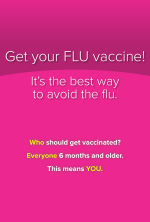Influenza (Flu) Fact Sheet
What is the flu?
The "flu" or influenza is a serious disease. At times it can lead to death. It is very contagious and spreads in the U.S. each year, starting in the fall and continuing through spring.
The flu is caused by a virus and spread mainly by coughing, sneezing or close contact. Young children and older adults are at highest risk of getting the flu but anyone can get it.
What are the symptoms?
Unlike a cold, flu symptoms start suddenly. They appear about 1-4 days after a person is exposed to the flu. Symptoms may include:
- Fever or feeling feverish/chills.
- Cough
- Sore throat
- Runny or stuffy nose
- Muscle or body aches
- Headache
- Tiredness
- Some people may have vomiting or diarrhea; this is more common in children.
How long is a person with the flu contagious?
You can pass the flu to others from 1 day before you have symptoms up to 5-7 days after you get sick. Some people might be able to infect others even longer.
Is there treatment?
The flu can be treated with antiviral drugs if started soon after you get sick. They will help reduce how sick you get and how long you are ill. Over the counter drugs like acetaminophen or ibuprofen may be taken to increase comfort. People with the flu need rest and fluids.
If my child or another family member has been exposed, what should I do?
Call your doctor or clinic for advice. Some people with a sick family member may be given an antiviral medicine to help prevent the flu.
Who's at higher risk for the flu?
Young children, older adults and people with weaker immune symptoms sometimes become sicker from the flu. This is also true if you have a condition such as heart and lung disease, asthma or diabetes. Having the flu while you're pregnant increases the risk of premature labor and delivery.
What are the complications of the flu?
Some complications include pneumonia, ear infections and dehydration. The flu can be serious and may require care in a hospital. Some people who get the flu could die.
What is the best way to prevent flu?
The single best way to prevent the flu is to get the flu shot. Everyone 6 months of age and older should get the flu vaccine every year. The flu shot cannot cause the flu.
- The flu shot is given with a needle, usually in the arm. It can be given to people 6 months of age and older.
Why do I need to get the flu vaccine every year?
New flu vaccines are produced every year to keep up with flu viruses that change rapidly over time. Antibodies to flu vaccine decline over time too – another reason to get a flu vaccine annually.
When should I get the flu vaccine?
Every year, as soon as it is available. It takes about two weeks to be fully effective, so it is important to get it before flu season begins, if possible. But, you can still get vaccinated through the spring and beyond. Even though flu season usually peaks in February, it can continue at least through May. Flu vaccine is offered at health care providers' offices, clinics and pharmacies.
What should I or my family members do if we travel out of the country?
Your risk for being exposed to the flu depends on what time of year you travel and where you go. In the Northern Hemisphere, flu season can beginas early as October and last until May. In the Southern Hemisphere flu season occurs from April through September. In tropical climates, flu can occur all year. Traveling with groups of international travelers, such as on a cruise ship, can increase your risk of exposure.
Travel and the Flu:
How can I learn about flu outbreaks?
The New York State Department of Health and the CDC track influenza throughout the flu season. For up-to-date information:
